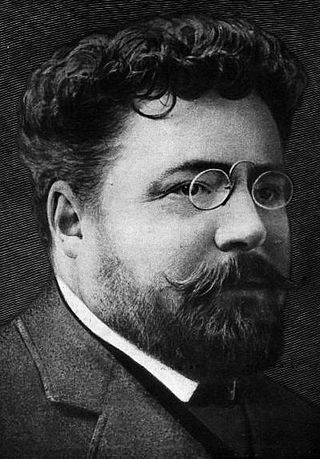
Gaston Louis Alfred Leroux was a French journalist and author of detective fiction.

Fantômas is a fictional character created by French writers Marcel Allain (1885–1969) and Pierre Souvestre (1874–1914).

Louis Feuillade was a French filmmaker of the silent era. Between 1906 and 1924, he directed over 630 films. He is primarily known for the crime serials Fantômas, Les Vampires and Judex made between 1913 and 1916.

Georges Franju was a French filmmaker. He was born in Fougères, Ille-et-Vilaine.
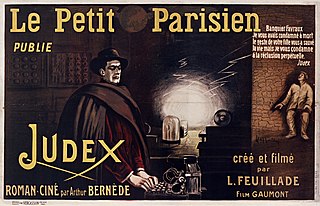
Judex is the title of a 1916 silent French film serial concerning the adventures of Judex, who is a pulp hero predating The Shadow, created by Louis Feuillade and Arthur Bernède.

Les Vampires is a 1915–1916 French silent crime serial film written and directed by Louis Feuillade. Set in Paris, it stars Édouard Mathé, Musidora and Marcel Lévesque. The main characters are a journalist and his friend who become involved in trying to uncover and stop a bizarre underground Apaches criminal gang, known as the Vampires. The serial consists of ten episodes, which vary greatly in length. Being roughly 7 hours long, it is considered one of the longest films ever made. It was produced and distributed by Feuillade's company Gaumont. Due to its stylistic similarities with Feuillade's other crime serials Fantômas and Judex, the three are often considered a trilogy.

Arthur Bernède was a French writer, poet, opera librettist, and playwright.

Jeanne Roques, known professionally as Musidora, was a French actress, film director, and writer. She is best known for her acting in silent films, and rose to public attention for roles in the Louis Feuillade serials Les Vampires as Irma Vep and in Judex as Marie Verdier.

Jean-Marc Lofficier is a French author of books about films and television programs, as well as numerous comics and translations of a number of animation screenplays. He usually collaborates with his wife, Randy Lofficier, and the reason why credits sometimes read "R. J. M. Lofficier", after the initials of both spouses.
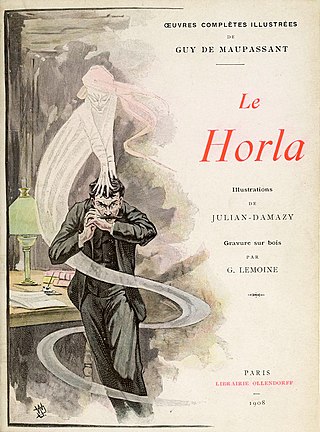
"The Horla" is an 1887 short horror story written in the style of a journal by the French writer Guy de Maupassant, after an initial version published in the newspaper Gil Blas, October 26, 1886.
Tales of the Shadowmen is an American anthology of short fiction edited by Jean-Marc Lofficier and Randy Lofficier and published by Black Coat Press. The stories share the conceit of taking place in a fictional world where all of the characters and events from pulp fiction, and in particular French adventure literature, actually exist in the same universe.

Belphégor is a 1927 crime novel by French writer Arthur Bernède, about a "phantom" which haunts the Louvre Museum, in reality a masked villain trying to steal a hidden treasure.

Doctor Omega is a 1906 science fiction novel by French writer Arnould Galopin. Inspired by H. G. Wells's novels The War of the Worlds and The First Men in the Moon, it follows the adventures of the eponymous scientist Doctor Omega and his companions in the spacecraft Cosmos.
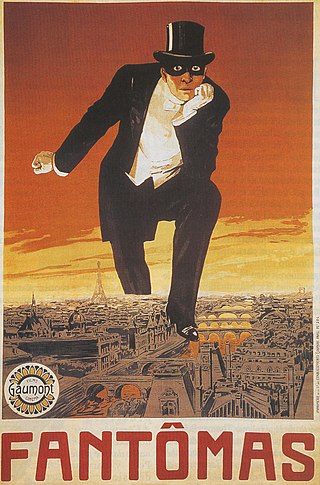
Fantômas is a French silent crime film serial directed by Louis Feuillade, based on the novel of the same name. The five episodes, initially released throughout 1913–14, were restored under the direction of Jacques Champreaux and released in this new form in 2006.
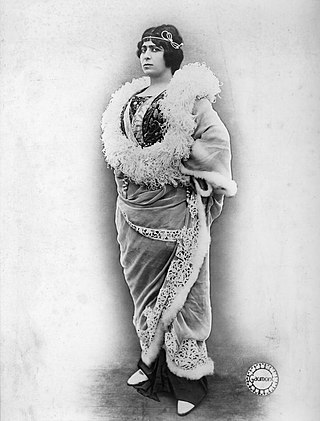
Renée Carl was a French actress of the silent era. She was born in Fontenay-le-Comte, Vendée, France, and died in Paris, France.

Yvette Andréyor was a French actress most popular in the era of silent film. She appeared in more than 100 films between 1910 and 1962.

Victorin-Hippolyte Jasset was an early film pioneer in France, active between the years 1905 and 1913. He worked on many genres of film and was particularly associated with the development of detective or crime serials, such as the Nick Carter and Zigomar series.
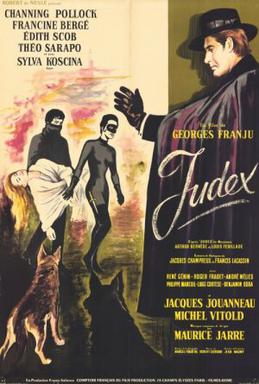
Judex is a 1963 French-language crime film remake of the 1916 French film serial of the same name concerning the adventures of pulp hero Judex. Directed by French filmmaker Georges Franju, the film stars Channing Pollock as Judex/Vallieres, Édith Scob as Jacqueline and Francine Bergé as Diana.

René Auguste Cresté was a French stage and film actor and director of the silent film era. Cresté is possibly best recalled as Judex, the title character in the Louis Feuillade-directed crime-adventure serial Judex, which ran in twelve installments in theaters from 1917 until 1918.
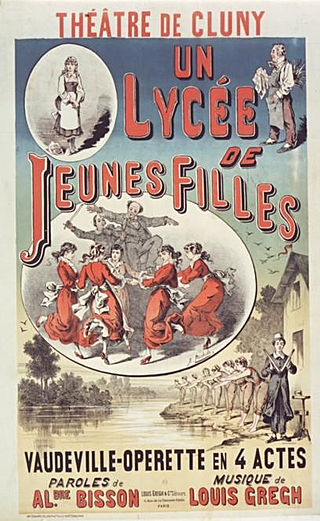
The théâtre de Cluny or théâtre Cluny was an entertainment venue located at 71 boulevard Saint-Germain in the 5th arrondissement of Paris, inaugurated in 1864 and closed in 1989.



















